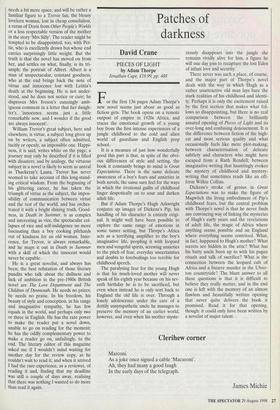Patches of darkness
David Crane
PIECES OF LIGHT by Adam Thorpe Jonathan Cape, £16.99, pp. 488 For the first 136 pages Adam Thorpe's new novel seems just about as good as fiction gets. The book opens on a remote outpost of empire in 1920s Africa, and traces the emotional growth of a young boy from the first intense experiences of a jungle childhood to the cold and alien world of guardians and English prep school.
It is a measure of just how wonderfully good this part is that, in spite of the obvi- ous differences of style and setting, the book it constantly brings to mind is Great Expectations. There is the same delicate awareness of a boy's fears and anxieties in both novels, the same sure feel for the ways in which the irrational guilts of childhood linger despotically on to sour and darken adult life.
But if Adam Thorpe's Hugh Arkwright conjures up images of Dickens's Pip, his handling of his character is entirely origi- nal. It might well have been possible to explore the same range of emotions in some tamer setting, but Thorpe's Africa acts as a terrifying amplifier to the boy's imaginative life, peopling it with leopard men and vengeful spirits, screwing anxieties to the pitch of fear, everyday uncertainties and doubts to forebodings too terrible for childhood speech.
The paralysing fear for the young Hugh is that his much-loved mother will never speak of his eighth year because on his sev- enth birthday he is to be sacrificed, but even when instead he is only sent back to England the old life is over. Through a lonely adolescence under the care of a dottily unsympathetic uncle he manages to preserve the memory of an earlier world, however, and even when his mother myste- riously disappears into the jungle she remains vividly alive for him, a figure he will one day join to recapture the lost Eden of infant love and security.
There never was such a place, of course, and the major part of Thorpe's novel deals with the way in which Hugh as a rather unattractive old man lays bare the stark realities of his childhood and identi- ty. Perhaps it is only the excitement raised by the first section that makes what fol- lows so disappointing, but there is no real comparison between the brilliantly assured opening of Pieces of Light and its over-long and confusing denouement. It is the difference between fiction of the high- est and most serious quality and what occasionally feels like mere plot-making; between characterisation of delicate subtlety and characters who might have escaped from a Ruth Rendell; between imaginative writing that hauntingly evokes the mystery of childhood and mystery- writing that sometimes reads like an off- form Wilkie Collins.
Dickens's stroke of genius in Great Expectations was to make the figure of Magwitch the living embodiment of Pip's childhood fears, but the central problem with Thorpe's novel is that he never finds any convincing way of linking the mysteries of Hugh's early years and the revelations of adult life, the magic of Africa where anything seems possible and an England where everything seems contrived. What, in fact, happened to Hugh's mother? What secrets are hidden in the attic? What has his batty uncle been up to with his pagan rituals and talk of sacrifice? What is the connection between the leopard cult of Africa and a bizarre murder in the Ulver- ton countryside? The blunt answer to all these questions is that it is difficult to believe they really matter, and in the end one is left with the memory of an almost flawless and beautifully written opening that never quite delivers the book it promised. Read it for that opening, though: it could only have been written by a novelist of major talent.


























































 Previous page
Previous page